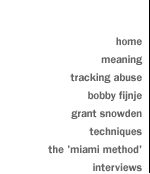 |  | 
In "The Child Terror," FRONTLINE correspondent Peter J. Boyer travels to Dade County, Florida to explore the impassioned roots and controversial consequences of the nation's 15-year legal battle against child sexual abuse. During the 1980s, Miami became ground zero in the crusade to prosecute child molesters. Many high-profile cases were prosecuted by the office of then-chief prosecutor Janet Reno who pioneered a national effort to bring child molesters to justice. Now, however, some of these cases are unraveling. In this report, FRONTLINE deconstructs two of the them, probing what went wrong.
In 1984, Harold Grant Snowden was a police officer who was chosen South Miami's Officer of the Year. Within a year, however, he stood accused of multiple charges of molesting preschoolers cared for by his wife. Snowden was acquitted of all charges by a jury that didn't believe the sole witness against him, a child. However, Miami prosecutors pressed forward. In 1986, lead prosecutor David Markus won conviction in a second trial by pursuing a strategy of multiple child witnesses and adding medical evidence to the case. At 39, Grant Snowden was sentenced to five life terms.
Bobby Fijnje, the other case focused on, had just turned fourteen when he was accused in 1989 of subjecting numerous children in his church daycare center to repeated sexual and satanic rituals. Fijnje was charged as an adult and locked away in juvenile jail for nearly two years before he was acquitted in what, at the time, was Dade County's most expensive criminal case.
In both the Fijnje and Snowden cases Miami prosecutors used the so-called 'Miami Method' a new way they devised to win convictions in child sexual abuse cases. Their successful formula included setting up a special children's center where videotaped forensic interviews with the children could be conducted by child therapists. They also used expert testimony at trial together with physical evidence indicating sexual abuse. Perhaps most important, they obtained multiple child witnesses in each case. It was a methodology that soon was emulated by prosecutors across the country to win child molestation convictions.
However, Bobby Fijnje's acquittal in 1991 focused increasing attention and controversy around the interviewing techniques utilized by child examiners like Dr. Laurie Braga in these cases. Slowly, across the country, widely-accepted, much-publicized child abuse convictions started to draw renewed public scrutiny as cases worked their way through the judicial appeals process. Research by national experts such as Dr. Stephen Ceci was indicating that many of the therapists' interviewing techniques were suggestive and coercive.
As for Grant Snowden, civil rights attorney Robert Rosenthal, in a federal habeas appeal, brought Snowden's conviction before the 11th Circuit citing improper use of crucial testimony and the lack of "other evidence of guilt." In 1998, after twelve years in jail, Mr. Snowden won his appeal. But the state of Florida has appealed the 11th Circuit decision to the U.S. Supreme Court. As of October 1998 the Court has not yet granted review but, more significantly, has not yet denied review for the current term.
 |  |  |